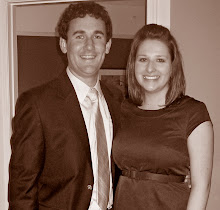 I think my current job is really good for me. Before working here, I often fooled myself into thinking I was super smart. I mean I did graduate with honors - but let's not kid ourselves... it was in communication (public relations) - not chemical engineering. BUT I will say the only "C" I ever got in college was in Chemistry 101 (which Chad has informed me is actually the weed-out course for chemistry majors... not the easy chemistry (which is chem 100). Glad my adviser clued me in on that -NOT.) But still - whenever I would write a particularly difficult story and realize that I understood what I was writing about - I'd be like "Hey - I'm so smart... I actually know this stuff!"
I think my current job is really good for me. Before working here, I often fooled myself into thinking I was super smart. I mean I did graduate with honors - but let's not kid ourselves... it was in communication (public relations) - not chemical engineering. BUT I will say the only "C" I ever got in college was in Chemistry 101 (which Chad has informed me is actually the weed-out course for chemistry majors... not the easy chemistry (which is chem 100). Glad my adviser clued me in on that -NOT.) But still - whenever I would write a particularly difficult story and realize that I understood what I was writing about - I'd be like "Hey - I'm so smart... I actually know this stuff!"One time I was convinced that I was incredibly intelligent, like genius level. I went online to the MENSA website and took some practice test questions. I got them all wrong (okay maybe not all... but seriously like 1 out of 20). I've stopped believing I'm a genius since then.
So anyways, in my current job, I get to learn so much about so many different topics. I spend most days talking to researchers and professors about topics they have devoted their lives to studying. While in college, I never really thought about professors doing more than teaching. Now that I work at one, I realize that teaching is the smallest part of what they do. All professors are (or at some point have) spent 90% of their time on their research. Usually something very, very specific.
What I've learned I love about these professors is that even when they have to explain their research to me (most of the time it is very, very scientific and technical - and let's face it, Bill Nye, I am not), they are always so patient and really want to help me understand. They love what they do (heck they've devoted their lives to it) and are often just grateful to talk to someone about it. I used to be worried to ask stupid questions - not stupid to the average person, but definitely stupid to someone who specializes in the stuff.
Take this wonderful professor I interviewed last week. He has received more than $1.3 million to study lithium ion batteries to help power hybrid and electric vehicles. He is working to make a 'better battery' by electrospinning polymer fibers. C'mon y'all it's not that hard - polymer. Just break it down. Poly = many. Mer = the word for "sea" in French?!?! See? Easy Peasy. ;)
So anyways, he's describing this complicated process to me and I'm trying my best to pay attention (especially difficult since English is very obviously not even close to being his native language) - but y'all know me. I can't focus on the big picture until I get some little questions answered. I've been holding it back the whole interview... and finally I can't take it anymore. I interrupt him and timidly ask, "Ummm... it's definitely neat the whole process of putting these fibers into a battery. But, well what exactly is in a battery now." Bless the professor's heart- he didn't look at me like I'm in idiot. No mumbling "stupid American" (at least in my presence). He just explains that current batteries have a powder in them (how many of you knew that... don't lie). I think they just care that I'm interested enough to ask questions - instead of just nodding my head... when obviously they know I have no clue what they're taking about.
So I think that's my favorite thing about my job. I found out batteries have powder in them. And remember - If any of you have any random questions you've always wanted to know the answer to, pass them along. I guarantee I'll find someone at this university that can answer them!

nu%3D32(2)46%3B)778)23%3B346%3B869244ot1lsi.jpg)







No comments:
Post a Comment